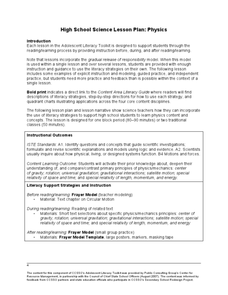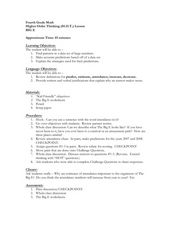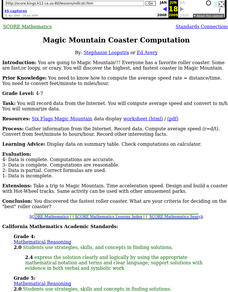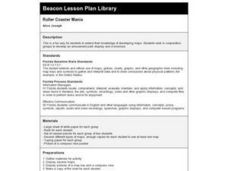Curated OER
Which Amusement Park Would You Choose?
Students analyze data related to amusement parks and create a spreadsheet to display the data. They read the data and predict which amusement park they think is safer, create a spreadsheet and graph, and write a proposal based on their...
Curated OER
Amusement Park Physics
Students get up close and personal with principles of motion. In this physics lesson plan, students collect and analyze acceleration data on amusement park rides. Students use CBLs to collect data in this lesson plan.
Curated OER
Roller Coasters: They're Fun, But Are They Safe?
Students survey people to find out what roller coasters they like, conduct Internet research to find information on dangers in amusement parks, contact experts on subject, and write feature that shows pros and cons of coasters.
Curated OER
WebQuest: Thrills and Spills- Pick Your Park!
Pupils participate in a WebQuest in which they must determine which amusement park is the "median priced" park. Students visit park websites to accumulate prices for parking, activities, restaurants, and gift shops.
Virginia Department of Education
Work and Power
Assist your class with correctly calculating the values for force, work, and power as they determine the amount various activities require. They gather data and participate in a group discussion to compare results upon conclusion of the...
Curated OER
Properties of the Ocean: Measurement
Students simulate the development of an underwater amusement park after reading background on Coral Reef State Park. They decide which factors they would need to consider such as the ocean floor, currents, wave patterns and water...
Alabama Learning Exchange
Energy and Work Amusement Park Style
Students distinguish between kinetic and potential energy. They recognize that energy can change from one form to other forms. They identify and describe several forms of energy.
Curated OER
Circular Motion
Twelfth graders discuss centrifugal force, frictional force, and critical speed as it relates to the popular amusement park ride, the Gravitron.
Curated OER
Higher Order Thinking (H.O.T.) Lesson - BIG E
Fourth graders work with patterns while using large numbers. In this patterning lesson, 4th graders go over the definitions of the words: predict, estimate, attendance, increase, and decrease. They complete worksheets in which they track...
Curated OER
Bungee M&M's
Eighth graders experiment with M&M's and a cup attached to a spring to to simulate a bungee jump. They graph the results of the experiment and make predictions for continuing the experiment. They determine the "line of best fit."
Curated OER
May The Force Be With You
Eighth graders investigate Newton's Laws of Motion. They use the example of a roller coaster for illustration purposes. A force associated with a roller coaster is tested, data graphed, and a conclusion is drawn. They use excel in order...
Curated OER
Magic Mountain Coaster Computation
Learners use the Internet to do research on the roller coasters at Magic Mountain Amusement Park. They must use mathematical formulas to calculate the highest and fastest coaster at the park.
Curated OER
Roller Coaster Mania
Fifth graders extend their knowledge of developing maps. They work in cooperative groups to develop an amusement park display and a brochure.
Curated OER
The Fair Factor
Students participate in playing many games to determine if they are fair or not. They create their own game that is fair to play with their classmates.
Curated OER
How Can They Tell?
Pupils compare the characteristics of arcade tokens to those of a circulating U.S. quarter to determine how a video game can tell the difference between the two. They examine coins and arcade tokens very closely to observe the differences.














